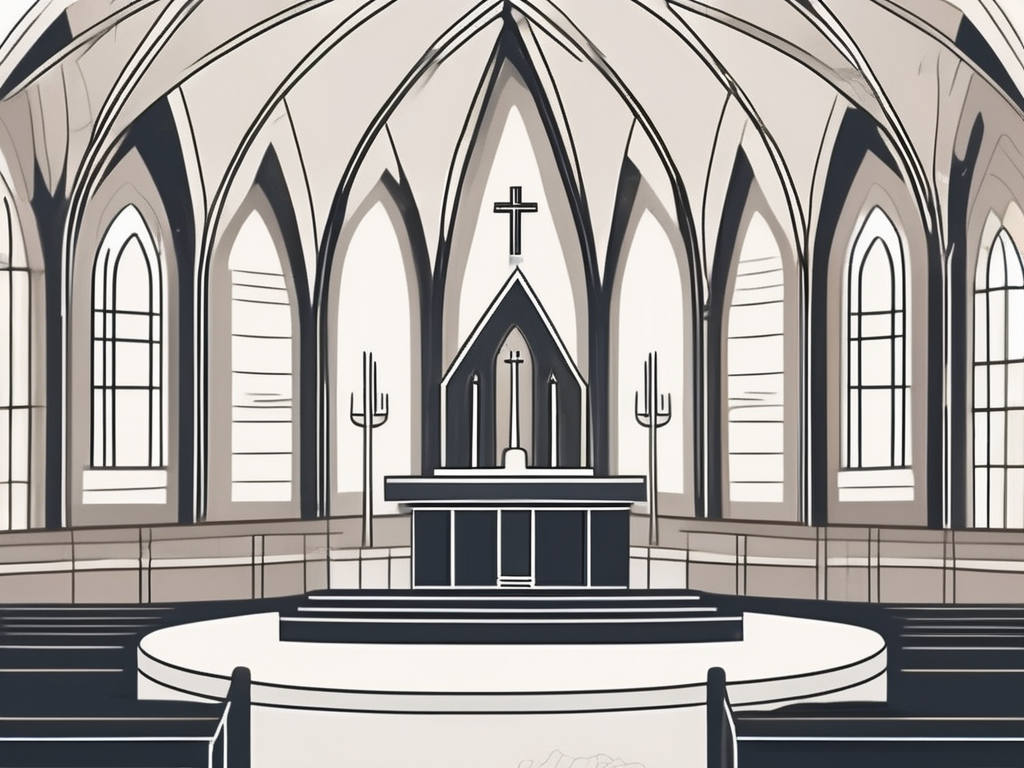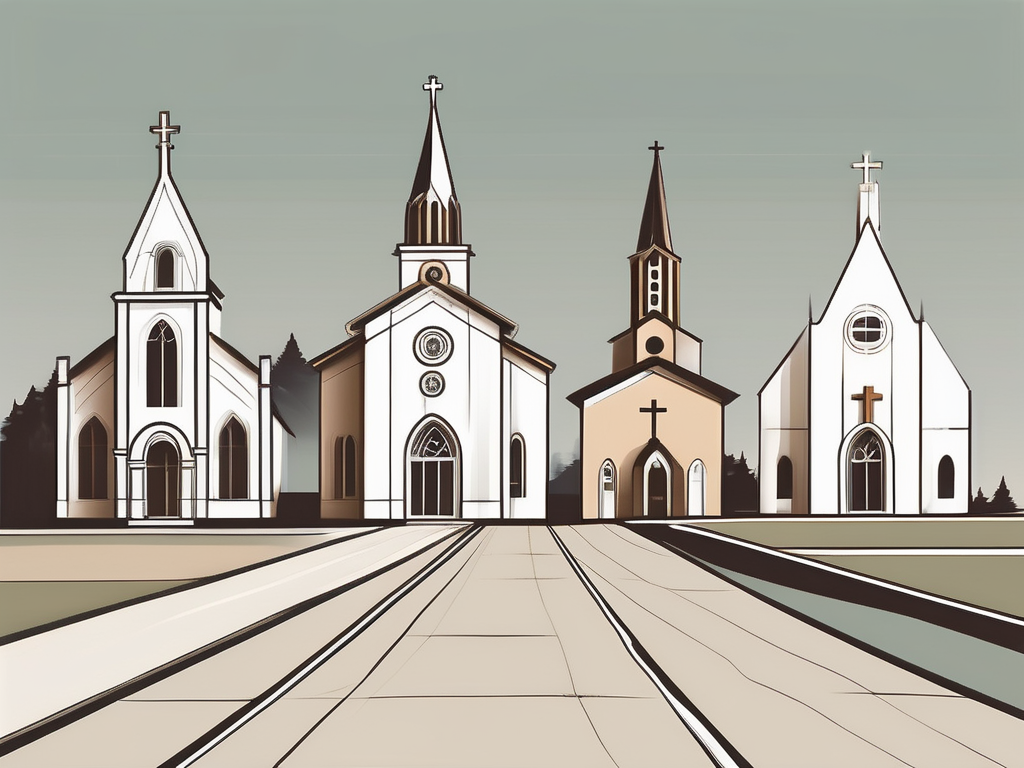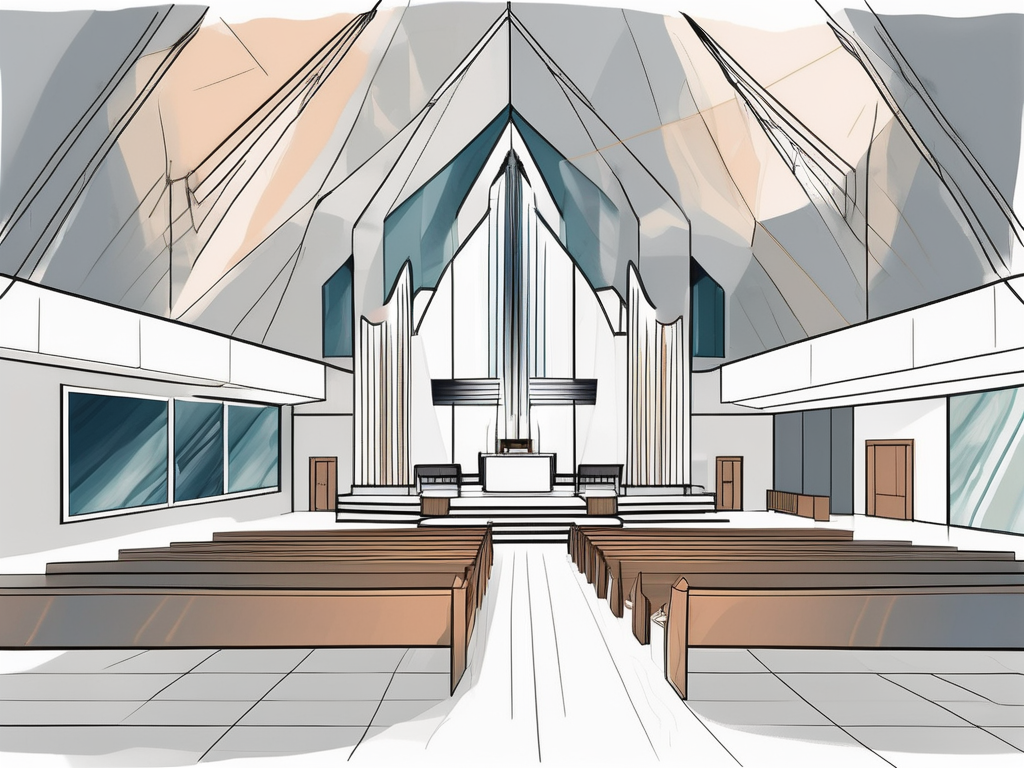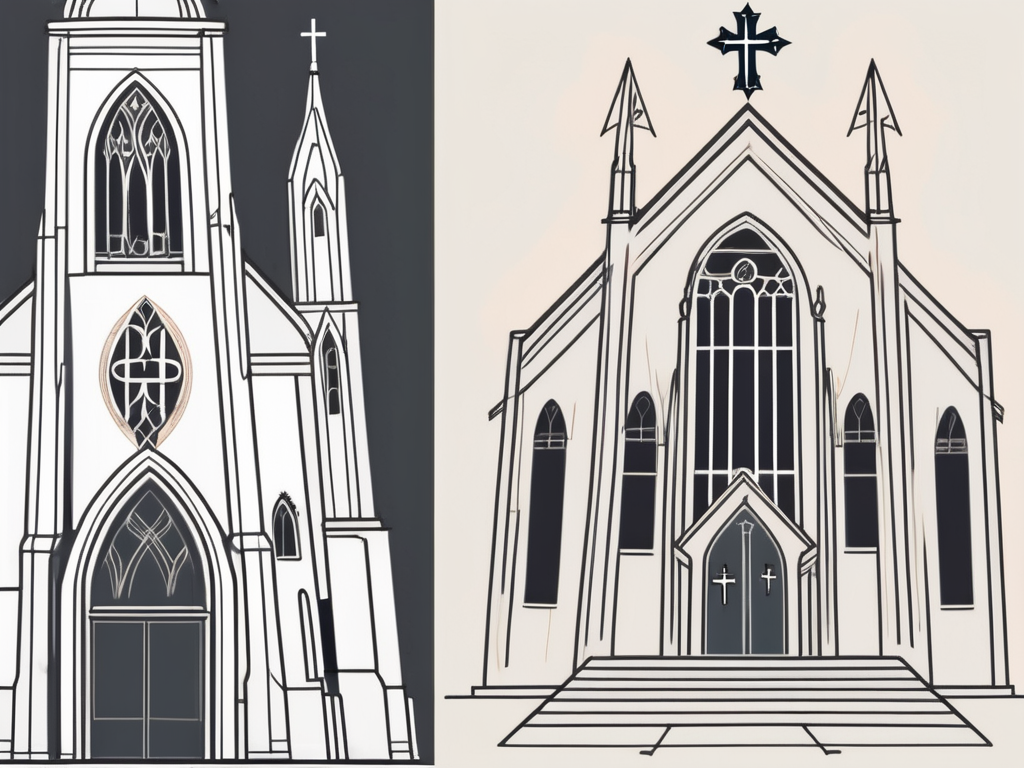A denominational church is a unique entity in the world of religion. With its own set of beliefs, practices, and organizational structure, a denominational church represents a distinct branch or subset within a larger religious tradition. In this article, we will explore the concept of a denominational church, its history, types, structure, and societal impact.
Understanding the Concept of a Denominational Church
Before delving into the intricacies of denominational churches, let’s establish a clear definition of the term “denomination” within a religious context. Essentially, a denomination is a subgroup within a particular religious tradition that shares common beliefs, rituals, and administrative structures. It represents a specific interpretation or variation of the broader religious teachings.
Denominational churches exist within various religious traditions, including Christianity, Islam, and Judaism, among others. Each denomination may have its own unique doctrines, rituals, and customs, which differentiate it from other denominations within the same religious tradition.
Defining Denomination in a Religious Context
When we talk about denominations in the context of religion, we are referring to religious organizations or groups that have distinct theological beliefs, practices, and governance structures. These denominational differences can emerge due to variations in scriptural interpretations, historical factors, cultural influences, or theological disagreements.
For example, within Christianity, there are numerous denominations such as Catholicism, Protestantism, and Eastern Orthodoxy. Each of these denominations has its own unique set of beliefs and practices, ranging from the veneration of saints in Catholicism to the emphasis on personal salvation in Protestantism.
In Islam, denominations such as Sunni and Shia have emerged due to differences in interpreting the succession of leadership after the death of Prophet Muhammad. These denominations have distinct rituals and legal frameworks, shaping the religious practices of their followers.
The Role and Purpose of a Denominational Church
A denominational church serves several important roles within a religious landscape. Firstly, it provides a sense of community and belonging for its members, fostering spiritual growth and religious identity. Denominational churches often offer regular worship services, religious education programs, and opportunities for fellowship and social connection.
For instance, within the Catholic Church, parish communities play a vital role in providing support and guidance to their members. They organize various activities such as Bible study groups, youth programs, and charitable initiatives, creating a strong sense of belonging and shared purpose.
Secondly, denominational churches act as custodians of specific religious traditions. They preserve and transmit the core beliefs, rituals, and values of the denomination across generations. Through their teachings and practices, denominational churches play a pivotal role in passing on the religious heritage to their members and shaping their religious worldview.
Moreover, denominational churches often serve as centers of religious authority, providing guidance and interpretation of religious texts and teachings. They may have clergy or religious leaders who are trained in theology and are responsible for guiding the spiritual journey of their congregations.
Additionally, denominational churches can have a significant impact on society at large. They may engage in social justice initiatives, advocating for the marginalized and promoting ethical values in the public sphere. Through their involvement in charitable work and community outreach programs, denominational churches contribute to the well-being of their local communities.
In conclusion, denominational churches play a crucial role in religious traditions by providing a sense of community, preserving religious traditions, and guiding the spiritual journey of their members. They are diverse and dynamic institutions that continue to shape the religious landscape through their beliefs, practices, and social engagement.
The History and Evolution of Denominational Churches
To comprehend denominational churches fully, we must explore their historical origins and the significant developments that have shaped their existence.
Denominational churches, with their diverse theological perspectives, worship styles, and organizational structures, have a rich and complex history that dates back to the Protestant Reformation in the 16th century. This pivotal period in Christian history brought about a splintering of the Christian faith, resulting in the emergence of various Protestant denominations as alternatives to the Roman Catholic Church.
The Reformation marked a turning point in the history of Christianity, as believers began to worship and interpret the scriptures through different lenses. This shift in religious thought and practice led to the formation of numerous denominations, each representing unique interpretations and approaches to Christian doctrine.
As denominational churches began to take shape, they faced various challenges and opportunities for growth. One significant development was the rise of ecumenism, which advocates for collaboration and dialogue between different Christian denominations. Ecumenical movements seek to foster unity and understanding among denominational churches, promoting shared values and joint efforts in areas such as social justice, interfaith dialogue, and humanitarian initiatives.
Over the centuries, denominational churches have continued to evolve and adapt to the changing religious and societal landscapes. They have undergone transformations in response to cultural shifts, scientific advancements, and socio-political changes.
One such transformation has been the incorporation of modern technology into worship practices. Denominational churches have embraced the use of multimedia presentations, live streaming of services, and online communities to reach a wider audience and engage with believers in new and innovative ways.
Additionally, denominational churches have played a vital role in shaping the educational landscape. Many denominations have established their own seminaries and theological institutions, providing comprehensive training for clergy and lay leaders. These educational institutions have contributed to the intellectual and spiritual development of individuals, equipping them with the knowledge and skills needed to serve their communities.
Furthermore, denominational churches have been at the forefront of social and political movements throughout history. They have advocated for civil rights, gender equality, and the eradication of poverty, among other causes. Denominational churches have often served as catalysts for social change, mobilizing their congregations to address pressing issues and promote justice and equality.
In conclusion, the history and evolution of denominational churches is a fascinating journey that spans centuries. From their origins in the Protestant Reformation to their role in shaping religious, social, and political landscapes, denominational churches continue to play a significant role in the lives of believers and society as a whole.
Different Types of Denominational Churches
Denominational churches encompass a wide array of religious groups, representing diverse theological perspectives and historical backgrounds. While it is impossible to cover every denomination in detail, let’s explore some of the main categories within denominational churches.
Denominational churches are a fascinating tapestry of religious diversity, each with its own unique beliefs, practices, and traditions. From Protestant denominations to Catholic and Orthodox churches, the world of denominational Christianity is a rich and complex one.
Protestant Denominational Churches
The Protestant tradition is perhaps the most well-known and diverse category of denominational churches. It includes various groups such as Lutherans, Baptists, Methodists, Presbyterians, Episcopalians, and Pentecostals, to name just a few. Protestant denominations differ in their interpretations of scripture, liturgical practices, and ecclesiastical structures.
Within the Protestant denominational churches, there is a wide spectrum of beliefs and practices. Some denominations, like the Lutherans, emphasize the importance of sacraments and liturgical worship, while others, like the Baptists, place a greater emphasis on personal faith and individual interpretation of scripture. Each denomination brings its own unique perspective to the table, contributing to the vibrant tapestry of Protestant Christianity.
Catholic Denominational Churches
The Roman Catholic Church, with its rich history and global presence, represents one of the largest denominational churches within Christianity. Led by the Pope, the Catholic Church emphasizes the authority of tradition, the sacraments, and the teachings of the Magisterium. Catholicism has distinct liturgical practices and hierarchical structures that set it apart from other denominations.
Within the Catholic denominational churches, there is a deep sense of unity and reverence. The sacraments, such as baptism and the Eucharist, play a central role in Catholic worship, and the Mass is a sacred and solemn occasion. The hierarchical structure of the Catholic Church, with its Pope, bishops, and priests, ensures a strong sense of authority and continuity throughout the centuries.
Orthodox Denominational Churches
The Orthodox Christian tradition, encompassing Eastern Orthodox churches, is another significant branch within denominational churches. Orthodox denominations, such as the Greek Orthodox Church, Russian Orthodox Church, and Coptic Orthodox Church, have distinctive liturgical practices, theological emphases, and spiritual traditions.
Orthodox denominational churches are known for their rich and ancient liturgical traditions. The Divine Liturgy, celebrated with great reverence and beauty, is the centerpiece of Orthodox worship. Icons, incense, and chanting create a sensory experience that transports worshippers into a realm of spiritual transcendence. The Orthodox Church also places a strong emphasis on the mystical and transformative power of prayer and asceticism.
Exploring the world of denominational churches is like embarking on a journey through the tapestry of Christian history and belief. Each denomination offers a unique perspective, contributing to the vibrant and diverse landscape of Christianity. From the rich liturgical traditions of the Orthodox Church to the personal faith and interpretation of scripture in Protestant denominations, denominational churches provide a space for individuals to connect with God in ways that resonate with their own spiritual journey.
The Structure and Governance of Denominational Churches
Denominational churches exhibit diverse organizational structures, reflecting their unique histories, traditions, and theological perspectives.
When examining the structure and governance of denominational churches, it becomes evident that there is no one-size-fits-all approach. Each denomination has its own distinct way of organizing itself, shaped by its beliefs, practices, and historical development.
Hierarchical Structure in Denominational Churches
Many denominational churches, particularly those within Catholicism and Orthodox Christianity, follow a hierarchical structure. They have a clear chain of command, with central authority vested in religious leaders such as bishops or patriarchs. These hierarchical structures, often spanning across regions or nations, provide a framework for decision-making, governance, and doctrinal oversight.
In Catholicism, for example, the Pope serves as the highest authority, considered the successor of Saint Peter and the head of the universal Church. Underneath the Pope, there is a hierarchy of cardinals, archbishops, bishops, and priests, each with their own responsibilities and areas of jurisdiction. This hierarchical structure ensures unity and consistency in matters of faith, doctrine, and discipline.
Similarly, in Orthodox Christianity, the Patriarch holds a position of authority, overseeing a regional or national church. The Patriarch, along with other bishops, collectively make decisions regarding the governance and direction of the Church.
Role of Clergy and Laity in Governance
In denominational churches, the roles and responsibilities of clergy and laity vary depending on the particular denomination’s theological framework. Clergy members, such as priests, ministers, or pastors, often play a central role in guiding the spiritual life of the community, administering sacraments, and leading worship services.
Within the clergy, there may be further distinctions based on rank or ordination. For instance, in the Catholic Church, there are different levels of ordination, including deacons, priests, and bishops. Each level carries specific responsibilities and authority within the Church.
The laity, or non-ordained members of the denomination, actively participate in various ministries, contribute to the community’s life, and may have a voice in decision-making processes. In some denominations, such as certain Protestant traditions, the laity plays a significant role in governing the church, with congregational voting and democratic processes shaping the direction of the community.
Furthermore, denominational churches often have committees, councils, or boards composed of both clergy and laity. These bodies work together to address administrative matters, financial decisions, and strategic planning for the church.
It is important to note that the balance of power and decision-making authority between clergy and laity can vary greatly among different denominations. Some denominations emphasize the authority of the clergy, while others prioritize the active involvement and input of the laity.
In conclusion, the structure and governance of denominational churches are multifaceted and intricate. Hierarchical structures provide a framework for decision-making and doctrinal oversight, while the roles of clergy and laity vary depending on the denomination’s theological framework. Understanding these structures and dynamics is crucial for comprehending the inner workings of denominational churches and the ways in which they govern themselves.
The Impact of Denominational Churches on Society
Beyond their religious significance, denominational churches exert a considerable influence on the broader society in which they exist.
Influence on Social Norms and Values
Denominational churches have historically played a role in shaping social norms, ethical values, and moral frameworks within their respective communities. Through their teachings, denominational churches contribute to public discourse on issues such as social justice, human rights, environmental stewardship, and family values. They often engage in charity work, advocacy, and community service, aiming to make a positive impact on society.
Denominational Churches and Community Building
Denominational churches have long served as centers for community cohesion and engagement, fostering a sense of belonging and solidarity among their members. They provide spaces for worship, fellowship, and mutual support, creating opportunities for individuals to connect with like-minded individuals and build meaningful relationships. Denominational churches also organize cultural events, educational programs, and social initiatives that contribute to the wider community’s well-being.
In Conclusion
In summary, a denominational church represents a specific branch or subset within a religious tradition, with its own set of beliefs, practices, and organizational structures. Denominational churches have a rich history, encompass various types within Christianity and other religious traditions, and play vital roles in the spiritual lives of their members and the wider society. By understanding what a denominational church is, we can gain insights into the diverse tapestry of religious expression around the world.












